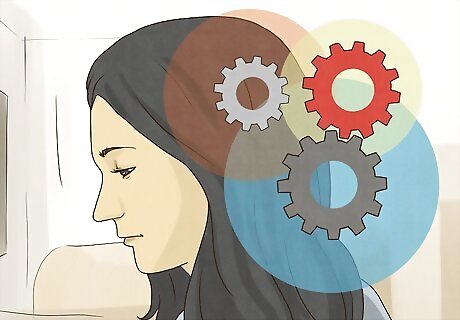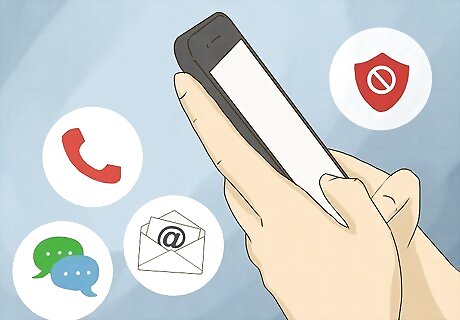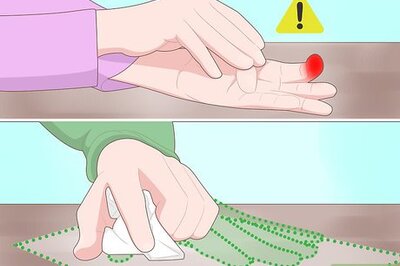
views
Here are 12 steps you can take to forgive your partner and find the healing you need.
Process your thoughts and feelings.

An emotional affair is a big deal, and shouldn’t be brushed under the rug. It’s great that you want to forgive your partner, but don’t suppress your own feelings to try and speed up the healing process. It’s absolutely okay and normal to feel angry, heartbroken, or even traumatized after uncovering an emotional affair. In the meantime, give yourself and your partner plenty of space, and don’t rush into any heated conversations. You might go for a walk by yourself, or listen to relaxing music in your room while your partner is away.
Ask yourself if you’re ready to forgive them.

There’s a lot of misinformation about forgiveness out there. Contrary to popular belief, forgiving your partner doesn’t erase the pain, excuse the affair, or repair the relationship. Above all, forgiveness is about freeing yourself from that pain and heartache. If you don’t feel quite ready to forgive your partner yet, that’s okay! Focus on healing and moving forward at your own pace. Ultimately, forgiveness is about looking toward the future instead of dwelling on the past. Reader Poll: If you're looking for a way to practice forgiveness, we asked 381 wikiHow readers who've been emotionally cheated on, and 59% of them agreed the best way to practice forgiveness is by praying for their partner. [Take Poll]
Confirm that the affair is over.

Ask your partner to cut off all contact if they haven’t already. Take away any temptation, so the affair can’t and won’t spring up again. This might involve blocking phone numbers, deleting social media contacts, and taking a close look at computer histories. Take however many steps you need with your partner to confirm that the affair is over and done with. You might encourage your partner to delete the other person’s contact info from their phone and email, and to block them on Twitter, Facebook, and other social media.
Ask your partner to explain why the affair occurred.

Understanding why the affair happened can help you grow and heal. Unfortunately, pretending that the emotional affair didn’t happen isn’t going to help anyone. Instead, ask your partner if you can both have a calm, honest conversation about their infidelity. Then, discuss why the affair happened, and where things went south in your relationship. It won’t be an easy conversation, but it will provide valuable clarity and insight about what went wrong. During this conversation, you might ask, “Why did you feel the need to talk with someone else?” or “Is there something else going on that you want to talk about?” For instance, your partner might have felt emotionally unsatisfied in the relationship, or they weren’t able to communicate what they really needed.
Explain how you’re feeling with “I” statements.

Open, honest communication is an essential part of healing and forgiveness. Relationship experts suggest using nonjudgmental “I” statements to talk things over with your partner. During the conversation, focus on expressing yourself in an open, transparent way. Discuss something hurtful that your partner has said or done, and how that action makes you feel. You could say, “When you’re constantly looking at your phone, I feel hurt, because I have a need for your respect and attention.” You might also say, “When you close me out of your life, I feel upset, because I have a need for emotional intimacy and communication.”
Ask your partner if they're sorry.

Honesty and remorse are key for moving forward. After an emotional affair, your mind may be reeling with questions, like “Why did this happen to me?” or “How am I supposed to keep going?” Before you focus on healing, ask your partner if they regret what they did. This can be a really difficult conversation to have, but it will help you start moving forward. You might say, “I need to know that you regret what happened” or “Are you sorry for cheating on me?” If your partner doesn’t show much remorse, you could say, “I really want to move forward and heal, but I need you to cooperate with me.”
Take time to reflect on your conversation.

Don’t blame yourself for the emotional affair or try to excuse their actions. Instead, focus on your partner as a human being, not on their affair. It can be really difficult at first, but try viewing the affair with empathy. This doesn’t mean that you’re excusing or writing it off—you’re just viewing it in a new perspective. Instead of thinking, “I’m not a good enough partner,” think, “Jake didn’t know how to communicate what he needed, and chose to have an emotional affair.”
Journal your thoughts.

Journaling is a great outlet for your negative emotions. After an emotional affair, your own thoughts and emotions might feel all over the place. That’s okay! Instead of burying those feelings, write out exactly how you feel, and how the emotional affair has impacted you. There’s no right or wrong to journal, as long as you’re getting your feelings out. For instance, you might write, “No matter how hard I try, I can’t stop feeling angry” or “It’s so hard to talk with Mike now that I know what he did.”
Rebuild trust through rigorous honesty.

Trust can be earned, but it takes time, effort, and patience. In the aftermath, ask your partner to be brutally and fearlessly honest from that point on. Your partner may say some hurtful, shocking things, but it’s necessary to help you heal and grow. To truly forgive your partner, you’ll need to know everything that happened. Rigorous honesty can be difficult in the beginning. Your partner might try to minimize their actions, not tell the full truth, or expect forgiveness right away. In each conversation, hold your partner accountable for their words and past actions.
Consult trustworthy friends and mentors.

You don’t have to heal and recover on your own. Trusted friends, spiritual leaders, and other mentors can offer a listening ear, while also providing some helpful perspective and advice. Spending time with a trustworthy support system is a great way to heal, and may help you feel more confident and comfortable forgiving your partner.
Talk to other victims of emotional cheating.

Support groups can provide lots of valuable perspective. Emotional affairs are incredibly difficult, and it can feel like no one understands what you’re going through. You’re not alone, though; in fact, there are countless people who are in the exact same boat as you. Stop by an online support group, and share what’s on your mind. Sites like SupportGroups.com, InfidelitySupportGroup.com, and Beyond Affairs Network are great resources to check out.
Visit a couples’ counselor.

A counselor can help address your issues in a healthy, productive way. During your sessions, a counselor can help reframe the affair, and offer tips and advice on how you both can move forward. After enough sessions and discussions, you might feel ready to forgive your partner. If you aren’t quite ready for couples’ counseling yet, visiting a counselor independently might be a big help.




















Comments
0 comment